- Home
- Tim Lebbon
Echo City Page 5
Echo City Read online
Page 5
They left the vat room and entered a place of chaos. There were tables and chairs, cupboards and shelving units, baskets slung in chains that could be raised and lowered from the ceiling when required, boxes strewn around the room’s perimeter, books piled high or pressed open on the surfaces, and many fine glass containers bearing all kinds of matter—some fluid, some more solid, and some that looked like heavy gas. Other containers held material not so easily identifiable.
Nadielle weaved across the room and through a curtained doorway. Gorham followed, and the smells of Nadielle’s living quarters inspired a rush of memories. He glanced at her bed—blankets awry, pillows propped up, books strewn across its surface—and wished that Malia had not come.
But their purpose here was serious, and Nadielle was aware of that. She guided them to her table and sat down.
“I know you’ve come for something important,” she said. “It’s not just another visit to read my mother’s books or to pore over the maps and charts I have down here. Not even …” She nodded toward the stacked bookshelf where the three Old Texts were hidden away. Gorham had read them, and the power and intelligence evident in books purported to be more than four thousand years old still staggered him.
“No,” he said, “not them. Although what we came to discuss might concern them more than ever before.”
“You Watchers,” Nadielle said, a smile pricking up the corners of her mouth.
“What do you mean by that?” Malia asked defensively.
“Always so serious. Always waiting for the end—”
“Not waiting for it,” Gorham said. “Expecting it. The city might have been here for five thousand years, or fifty thousand, but nothing lasts forever. We watch for Echo City’s inevitable end so we can be ready for it.”
“Don’t mock our purpose,” Malia added coldly. “When the end comes, we’ll have our way across the desert.”
“Maybe you will,” Nadielle said, nodding, and the smile was still there. “For now let’s eat. You’ve been on the road for a while, and no good decisions are ever made on an empty stomach.”
So the three of them ate. The food was cold but delightful. There were breads and cheeses, smoked meats, dried fruit, yogurts flavored with some of the finest spices, and a sake-fish whose pinkness and subtlety meant it must have come from the Northern Reservoir. Malia ate quickly beside him, eager to get to why they had come, but Nadielle savored each mouthful. Gorham wondered yet again how she managed to procure such good food. The bread had the taste and texture of the very best of the Marcellan bakers, and the cheese must have been matured for a long time. He could ask, but he knew that her answer would be misleading.
“How are you, Malia?” Nadielle asked. The question’s meaning was obvious.
Malia shrugged, chewing a mouthful of mixed dried fruit.
Nadielle nodded slowly. “It heals, with time.”
“You’re twenty years old! If Bren and I’d had children, you could have been one of them.” Malia trailed off, staring down at the tabletop but seeing something much farther away.
“My apologies,” Nadielle said, but Gorham could see that she was not sorry at all. There was something about Nadielle that removed her from the world of Echo City. It wasn’t even the fact that she chose to live belowground, with only the Echoes and her strange creations for company. Sometimes when he looked into her bright young eyes, there was such age there that it terrified him.
“It doesn’t matter,” Malia said, still staring down at the table.
They ate in silence for a while, Gorham trying to catch Nadielle’s eye. But she looked down at her plate, cutting food very precisely, building meat on bread on cheese to gain the most of their blend of tastes. He watched her smooth hands and remembered them working at him with equal dexterity. Everyone who knew of her feared the Baker, and he wondered what his friends would think if they knew about their liaison.
When they had finished eating, Nadielle sat back in her chair and stretched her lithe body beneath the roomy clothes she always wore. Then she poured them each another glass of fine Crescent wine, raised her glass in silent toast, and waited for them to begin.
“We have people all over the city,” Malia said. “Watchers, like us, and sometimes just people ready to earn a few shillings. They’re instructed or paid to watch for certain things. Signs. Events out of the ordinary. Anything that might signify change. There are frequent false alarms, of course. Messages passed along that have already lost their meaning by the time they reach us. Lies, from people bored of waiting and wanting some money.”
“But this is no false alarm,” Gorham said.
Nadielle raised an amused eyebrow, but he saw a flash of something darker. Interest? Fear?
“What is no false alarm?”
Gorham glanced at Malia, and she nodded that he should continue. “It comes from three sources,” he said. “First, Malia knows an explorer of the Echoes, Sprote Felder, and he has limited contact with the Garthans. He studies them, believes he has their trust, and he says there is concern among several of their deepest settlements. He wasn’t specific, other than saying they were unsettled.”
“Sprote is a mad old fool,” Nadielle said, laughing.
Gorham blinked in surprise. She told me she never leaves this place. “He’s a historian,” he said. “His work on the Course Canton Echoes is well respected.”
“Respected by some,” Nadielle countered. “And I didn’t say he was stupid, I said he was mad. He spends all his time down in the past.”
“As do you,” Malia said.
“You know nothing about me,” Nadielle said after a pause, staring at Malia until she looked away. “So, the second source?”
“A priest from the Temple of the Seventy-seven Custodians,” Gorham said.
Nadielle glanced back and forth between Gorham and Malia as if expecting a joke.
“They’re harmless enough,” Malia said. “And the Hanharans accept them.”
“They allow them. It’s different.”
Malia shrugged.
“I trust him,” Gorham said. “He’s a good man, if misguided. And just because he thinks his beliefs are right, he doesn’t insist that we are wrong.”
“How magnanimous of him,” Nadielle said.
“His elders are learned men and women. Intellectuals, not fanatics. Not mad. So I trust him, and he trusts them. And they say that something is coming.”
Nadielle was silent for a while, blinking softly in the gentle glow of candlelight. She sipped her wine, picked at the remains of a loaf of bread, and hummed a tuneless melody.
“And the third source?” she said at last.
Gorham looked sidelong at Malia. They’d disputed whether or not to reveal their third source, not because of her privacy but because … well, because she was mad.
“Bellia Ton.”
Nadielle laughed—a deep, throaty cough that did worrying things to Gorham’s composure. She chuckled like that just after she came.
“The river reader?” the Baker asked. “You claim two sources that aren’t mad but I say may be. And then you bring her into the tale? She’s as mad as ten rockzards fucking a chickpig.”
“Nicely put,” Malia muttered.
Gorham held out his hands, palms up, and stood from the table. “Hear us,” he said. “She’s unreliable, but when she tells a story that meshes with others we’ve heard, we have to consider its veracity.”
“And what story does the mad old hag tell you, Gorham?” Nadielle asked. Her eyes had grown icy, and he didn’t like that. Neither did he understand it. He looked to Malia for support, but she was pouting as she picked the flesh from a slice of dried mepple.
“She holds court in a tavern in Mino Mont, right out by the city wall, close to where the River Tharin flows out into the desert.”
“I know where she spouts her tales.”
“One of our people was there.”
“A Watcher?”
Gorham shook his head.
“Someone who sells us information,” Malia said. “That doesn’t mean it’s false.”
Nadielle was shaking her head, but Gorham went on, angry at her for dismissing something before she’d even heard it.
“She listens to the river, claims she can judge the health of the city by reading the waters that have flowed through it.”
“The dead waters,” Nadielle said. “Nothing lives in the river. It’s as dead, and deadly, as the desert it comes from and goes to again.”
“Maybe … but she heard sounds in the waters,” Gorham said. “Noises from below, she said. Deeper than the Echoes, deeper than where any Garthans live, beneath Marcellan Canton where the Falls are, and—”
Nadielle stood quickly, her eyes growing wide and her glass tipping over. Wine flowed onto the bread platter and soaked in like spilled blood. “Do you know how she claims to read the river?” she asked, and Gorham thought he had never seen her so animated. “She dips her hands and feet in. She sits on the riverbank among the water refineries and touches the water. Sometimes she stays that way for half a day. So her madness isn’t a weakness, really, but a strength. Do you know anyone else who could survive those poisoned waters for so long?”
“No,” Gorham said.
“And have you any idea what that must do to her?”
“Why are you angry?” Malia asked.
Nadielle turned away, but not before Gorham saw that dark look in her eyes again. This time, he was certain it was fear.
“Because you’re wasting my time,” she said. “You’ve come here for what exactly?”
“To ask you to work faster,” Gorham said. “The time might come soon when we have to attempt travel across the Bonelands.”
The Baker laughed, and this time there was nothing orgasmic about it at all. This laughter was harsh, cruel, and tinged with a note of hysteria.
“You have no idea what I do here, so how can you ask something like that?”
Gorham glanced at Malia, who raised one eyebrow in an expression of defeat.
“We should go,” Malia whispered, quiet enough so that Nadielle did not hear. “I’ve never liked this fucking place.”
Gorham looked across the room at the large rumpled bed again, confused at why the Baker should act like this. Hadn’t they secured her services for just such an occasion? Hadn’t many people suffered because of this?
He closed his eyes, thought of Peer and that she would never be dead to him, even when one day she truly died.
“Nadielle, we’re all sure that something is happening.”
The Baker had reached the curtained doorway now, and she turned back to them, her face softening slightly. But there was still something very different about her. When they’d arrived, she seemed composed and perhaps amused at their discomfort; now there was a disturbing edge to her movements and voice. A sharp edge. “I’m busy, Gorham. I am working as fast as I can.” And when she lifted the curtain aside, they both knew it was an invitation to leave.
Malia stood and walked to the door, glancing back at Gorham before stepping through. Does she know? Gorham thought, but right then it no longer seemed to matter. He was leaving again, and his heart thundered.
“Nadielle,” he pleaded. She stood just beyond his reach.
“Gorham, now isn’t the time,” she said. She smiled sadly, and again he saw that strain behind her eyes, dulling them like the accumulated dust of generations on the finest oil painting.
He nodded, wished he could say more, wished he could touch her. And then the Pserans appeared from nowhere and stood around him, ready to guide him and Malia away from the Baker’s laboratory.
“See you soon,” he said, but Nadielle did not answer. He left without looking at her again, and Malia gripped his arm—a friendly touch that meant the world.
By the time evening arrived, Peer knew that she could no longer remain in Skulk Canton. She might have been banished there, excluded from the rest of Echo City in its entirety, guilty of sedition in the eyes of the ruling Marcellans and blasphemy according to their Hanharan priests, and certain to be caught and executed should she attempt to return—but this was just too important. She could not place her own safety ahead of what this man’s arrival might mean. So she would sit with the stranger through the night, nursing him as best she could, and come morning she would tell Penler goodbye.
Since helping the stranger up into the city from the cursed desert, Peer had tried hard to make sense of anything he had to say. The storm had intensified, and as she’d guided him through the streets, she was grateful because it kept most people under cover. The rain and lightning had stopped soon after she closed her door on the weather and offered him her bed to rest.
For a moment this afternoon, she’d believed that the stranger was stirring. He’d sat up on her bed, staring at the window and lifting his hands as if to push them through the glass. But then he’d looked around slowly, his wide eyes relaxing slightly as he saw her, and he’d rested again. He had been asleep ever since.
The man muttered in his sleep. He spoke broken, heavily accented Echoian, and that troubled her, because if he was from beyond, then where was his alien language? She could decipher little of what he said—random words, mumblings, and sometimes cries—but still she tried, because it gave her something to concentrate on, something to occupy her mind.…
This is the most amazing thing ever to happen to Echo City! she thought. She sat beside the bed, looking down at the frowning man, and in him she saw every hope the Watchers had ever expressed and every doubt that had ever been aimed at the Hanharans. He was special, and precious. If the Marcellans learned of his existence, they would execute him like every other Pretender they had caught—anyone who claimed an ability to travel the desert was treated the same way—and declare a day of feasting and celebration for the city. Peer closed her eyes, wondering whether any of those past Pretenders had been from the same place as this man.
And, if so, what had happened to those who helped?
“This is so much more than me,” she whispered. The man stirred, turning his head as if looking for whoever had spoken, but his eyes remained closed. His breathing was ragged and dry, his dark skin burned by the sun and raised in countless minute pustules, his white hair clotted with sand. Those few times he had opened his eyes, she had seen how green they were. He was unlike anyone she had ever known.
She suddenly remembered that she was supposed to be eating with Penler that evening. For a moment she considered taking the stranger over there right away, but night in Skulk was dangerous. There were the gangs, and there were rockzards the size of humans living in the ruins, emerging only at night to feed. She could not risk him for anything. And, besides, she had never been the most reliable person. Penler would be annoyed at her absence but not worried.
Tomorrow she would make it up to him.
As the night drew on, and the man seemed to drift into a deeper, calmer sleep, Peer stood by her table, looking down at his shoulder bag. She touched it but did not recognize the material. Not silk, not canvas; it felt brittle but looked so strong. And those things she’d seen, protruding from the bag’s open neck and still there now …
It felt so wrong, but she reached for the bag and loosened its string tie.
The man did not stir.
Guilt already weighing heavy, Peer opened the bag and emptied its contents across her table.
Later, staring at the man’s belongings, terrified and excited in equal measures, she sensed that she was being watched.
She glanced at her bed and he was looking at her, blinking softly. He raised his left hand to his mouth to mimic taking a drink. She handed him a cup and he sipped at the water, then drank more greedily.
“Not too much,” she said.
“More,” he said, and his rough hand closed around hers to tip the cup farther. When he’d finished the water, he lay back onto the pillow, panting slightly and staring at the ceiling.
&nb
sp; “You speak Echoian?”
“Echoian?”
“You do.” She stood beside the bed, not quite knowing what to do. He forms his words strangely. They sound different but mean the same.
“I don’t know,” he said, but he did not elaborate.
“Where are you from?”
“Not here,” he said, shaking his head. Desert dust fell from his hair, and Peer wondered whether she could die from that.
But he hadn’t died. What did that mean?
“What’s your name?”
“Name?”
“My name is Peer Nadawa.”
“Peer.” He looked at her, and his mouth lifted in a faint smile. “You’re not her.”
“Not who?” she asked. He turned away. “Your name?”
The man closed his eyes, the frown returning. “No name.”
“Listen …” Peer began, then she sighed and sat on the edge of the bed, relieving the weight from her aching hip. The man’s hand was close to her thigh. She lifted it gently to examine his sunburn and the grit of his incredible journey collected beneath his fingernails.
“You’re not scared,” the man whispered.
“I’m fucking terrified!” She realized that she was crying, surprised at the aching nostalgia she suddenly felt for simpler times. Like yesterday. “I’m terrified because you’re going to change everything. I need to take you to see some people, and they’ll be amazed, and some other people will hate that you’re here. They might even try to …”

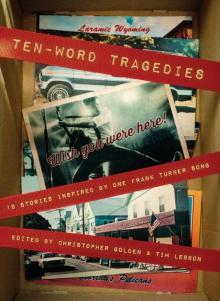 Ten-Word Tragedies
Ten-Word Tragedies Predator: Incursion
Predator: Incursion Relics--The Edge
Relics--The Edge Firefly
Firefly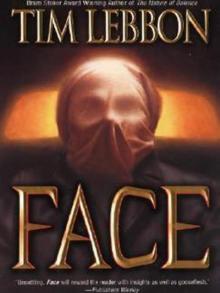 Face
Face Generations
Generations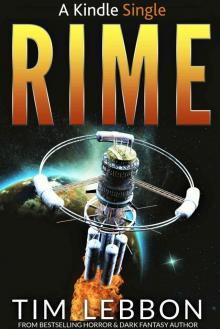 RIME (Kindle Single)
RIME (Kindle Single) Fallen
Fallen London Eye tc-1
London Eye tc-1 Kong: Skull Island
Kong: Skull Island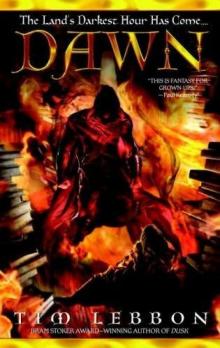 Dawn n-2
Dawn n-2 Into the Void: Star Wars (Dawn of the Jedi)
Into the Void: Star Wars (Dawn of the Jedi) The Everlasting
The Everlasting London Eye: 1 (Toxic City)
London Eye: 1 (Toxic City)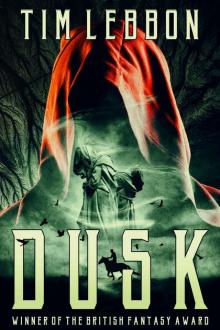 Dusk: a dark fantasy novel (A Noreela novel)
Dusk: a dark fantasy novel (A Noreela novel)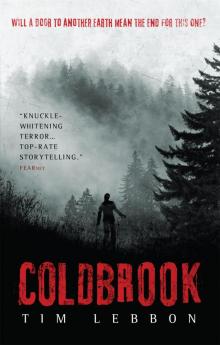 Coldbrook
Coldbrook Alien
Alien Dusk
Dusk The Cabin in the Woods
The Cabin in the Woods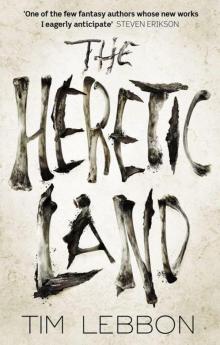 The Heretic Land
The Heretic Land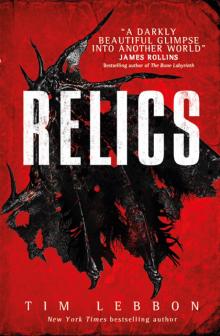 Relics
Relics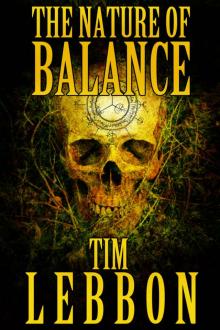 The Nature of Balance
The Nature of Balance Echo City
Echo City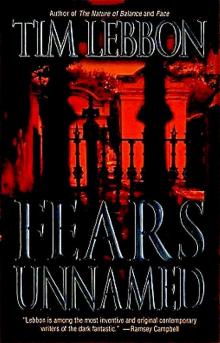 Tim Lebbon - Fears Unnamed
Tim Lebbon - Fears Unnamed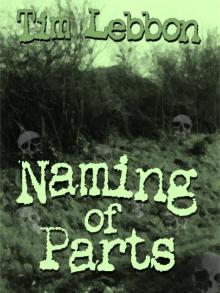 Naming of Parts
Naming of Parts Alien--Invasion
Alien--Invasion Vale of Blood Roses
Vale of Blood Roses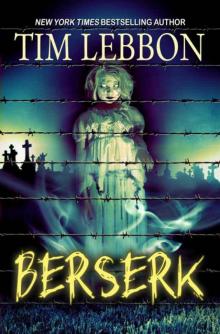 Berserk
Berserk Coldbrook (Hammer)
Coldbrook (Hammer) Contagion tc-3
Contagion tc-3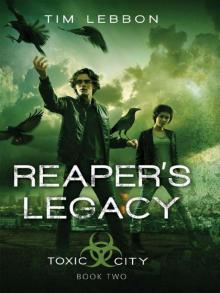 Reaper's Legacy: Book Two (Toxic City)
Reaper's Legacy: Book Two (Toxic City)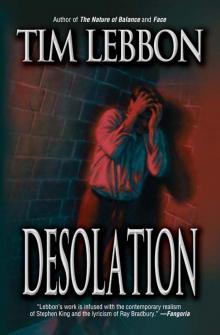 Desolation
Desolation Unnatural Selection
Unnatural Selection Predator - Incursion
Predator - Incursion London Eye
London Eye Contagion (Toxic City Book Three)
Contagion (Toxic City Book Three) The Silence
The Silence The Thief of Broken Toys
The Thief of Broken Toys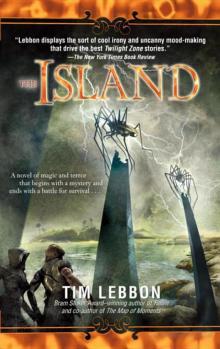 Tales of Noreela 04: The Island
Tales of Noreela 04: The Island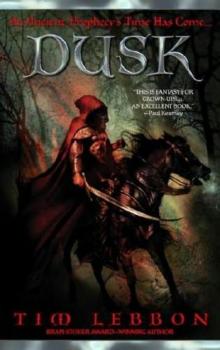 Dusk n-1
Dusk n-1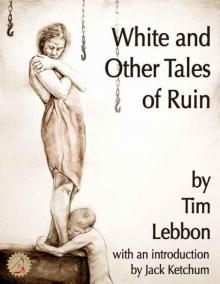 White and Other Tales of Ruin
White and Other Tales of Ruin A Whisper of Southern Lights
A Whisper of Southern Lights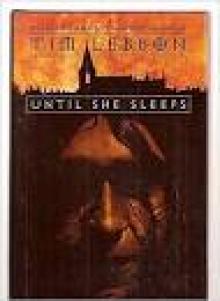 Until She Sleeps
Until She Sleeps Relics--The Folded Land
Relics--The Folded Land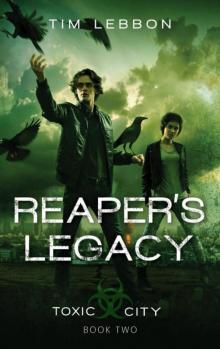 Reaper's Legacy tc-2
Reaper's Legacy tc-2 Alien: Out of the Shadows
Alien: Out of the Shadows Pieces of Hate
Pieces of Hate X-Files: Trust No One
X-Files: Trust No One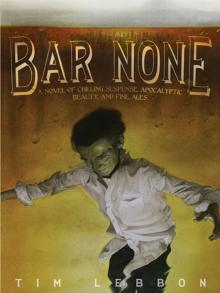 Bar None
Bar None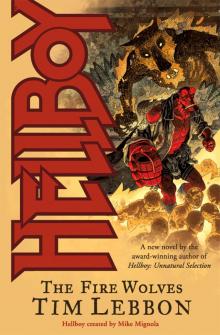 The Fire Wolves
The Fire Wolves